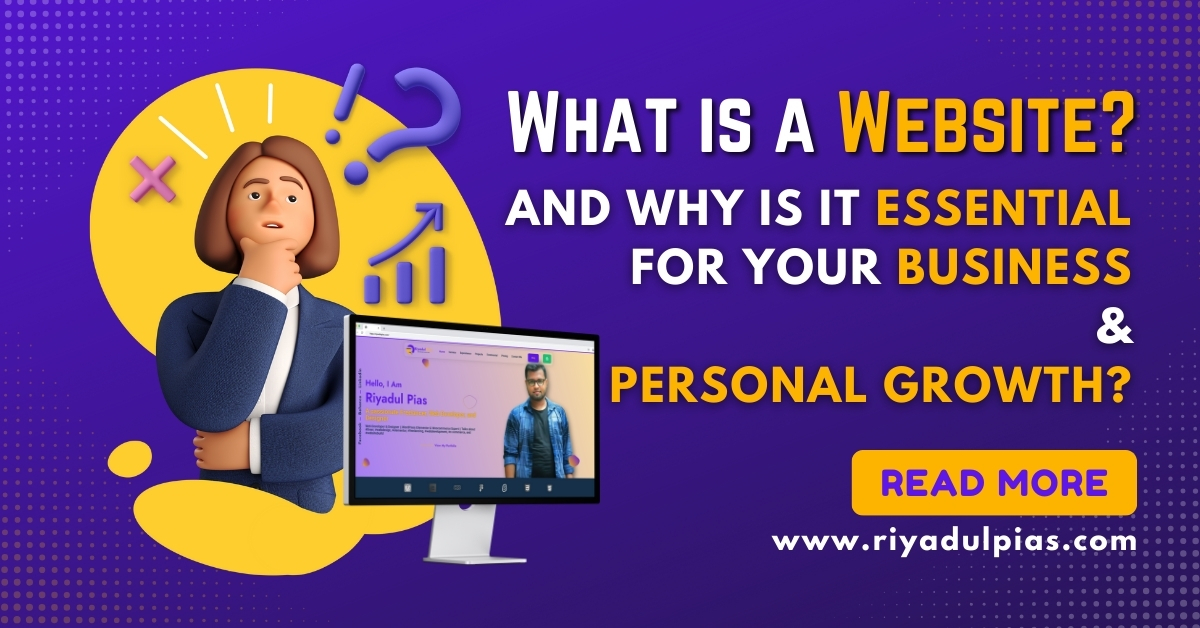Introduction
In today’s digital world, websites have become an integral part of our daily lives. Whether you are running a business, building a personal brand, or simply looking for information, a website serves as a crucial platform to establish an online presence. But what exactly is a website, and why do you need one? In this blog, we will explore the definition of a website, its key components, and the benefits of having one.
What is a Website?
A website is a collection of web pages that are interconnected and accessible through the internet. It is hosted on a server and has a unique domain name that allows users to find and access it through a web browser. Websites can serve various purposes, including information sharing, e-commerce, entertainment, and communication.
Websites can be broadly categorized into different types, such as:
Personal Websites
– Blogs, portfolios, or personal branding sites.
Business Websites
– Company websites, e-commerce platforms, or service-based websites.
Educational Websites
– Online learning platforms, university websites, or research portals.
Entertainment Websites
– News portals, streaming services, and gaming sites.
Social Media Websites
– Platforms like Facebook, Instagram, and Twitter that connect people.
Each of these websites serves a unique function but shares a common goal – to provide information and engage visitors.
Why is a Website Needed?
A website is essential for both businesses and individuals in various ways. Let’s dive into some of the top reasons why having a website is crucial:
1. Establishes an Online Presence
With the increasing use of the internet, people search for products, services, and information online. Having a website ensures that your business or personal brand is visible and accessible to a global audience.
2. Builds Credibility and Trust
A professional website adds credibility to your business. Customers trust companies that have a well-designed website with relevant information about products, services, and contact details. It also helps individuals showcase their expertise through personal blogs or portfolios.
3. Enhances Marketing and Branding
A website is a powerful marketing tool that allows businesses to promote their products and services effectively. With SEO optimization, businesses can rank higher on search engines, attract more visitors, and convert them into customers.
4. Increases Sales and Revenue
For businesses, especially e-commerce websites, an online presence means more opportunities for sales. Customers can explore products, read reviews, and make purchases anytime, increasing revenue potential.
5. Cost-Effective Advertising
Compared to traditional advertising methods, such as TV or print ads, a website provides a cost-effective way to market your brand. With tools like social media integration, email marketing, and SEO, you can reach a larger audience without high costs.
6. Available 24/7
A website operates around the clock, unlike physical stores that have limited hours. Customers can visit your website at any time, making it a convenient platform for both businesses and users.
7. Showcases Your Portfolio or Work
For freelancers, artists, designers, and professionals, a website acts as a portfolio that highlights their skills, work samples, and experience. This helps in attracting potential clients or employers.
8. Supports Customer Service and Communication
Websites often have contact forms, chatbots, or FAQs that assist customers with their queries. This improves customer experience and engagement, leading to higher satisfaction and retention.
9. Helps in Business Growth and Expansion
With an online presence, businesses can expand their reach beyond geographical limits. A website enables global accessibility, allowing businesses to scale and attract international clients.
10. Keeps You Competitive
In today’s competitive market, businesses without websites lose potential customers to competitors who have an online presence. A well-optimized website helps you stay ahead in your industry.
How to Create an Effective Website?
To build a successful website, follow these essential steps:
Choose a Domain Name:
Select a relevant and memorable domain name that represents your brand.
Select a Reliable Hosting Service:
Choose a hosting provider that ensures fast loading speeds and security.
Design a User-Friendly Layout:
Use a responsive design to provide a seamless experience on all devices.
Optimize for SEO:
Implement SEO strategies to improve visibility on search engines.
Regularly Update Content:
Keep your website updated with fresh and engaging content.
Ensure Security:
Use SSL certificates and security measures to protect user data.
Conclusion
A website is no longer a luxury but a necessity in today’s digital landscape. Whether you are a business owner, freelancer, or individual looking to establish your online presence, having a website brings credibility, marketing opportunities, and growth potential. Investing in a well-designed and optimized website will help you reach a wider audience and achieve long-term success.





